
Menwith Hill Station, UK
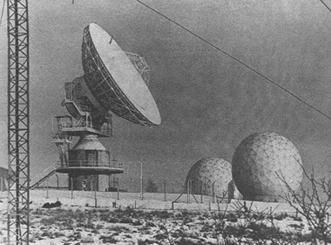 ( 54.0162 N; 1.6826 W ) Menwith Hill in the UK is the principal NATO theater ground segment node for high altitude signals intelligence satellites. The facility, jointly operated with the UK's Government Communications Headquarters (GCHQ), is now capable of carrying out two million intercepts per hour. Menwith Hill Station was established in 1956 by the US Army Security Agency (ASA). Menwith Hill was operated by ASA from 1958 until its turnover to NSA in June 1966. The Army 713th MI Group remains the Executive Agent for the NSA Menwith Hill field site, which was awarded the NSA's "Station of the Year" prize for 1991 after its role in the Gulf War. The Air Intelligence Agency 451st Intelligence Squadron (451 IS) as an integral part of Menwith Hill Station (MHS). Inside the closely-guarded 560 acre base are two large operations blocks and many satellite tracking dishes and domes. Initial operations focused on monitoring international cable and microwave communications passing through Britain. In the early 1960s Menwith Hill was one of the first sites in the world to receive sophisticated early IBM computers, with which NSA automated the labor-intensive watch-list scrutiny of intercepted but unenciphered telex messages. Since then, Menwith Hill has sifted the international messages, telegrams, and telephone calls of citizens, corporations or governments to select information of political, military or economic value. The official cover story is that the all-civilian base is a Department of Defense communications station. The British Ministry of Defence describe Menwith Hill as a "communications relay centre." Like all good cover stories, this has a strong element of truth to it. Until 1974, Menwith Hill's SIGINT specialty was evidently the interception of International Leased Carrier signals, the communications links run by civil agencies -- the Post, Telegraph and Telephone ministries of eastern and western European countries. The National Security Agency took over Menwith Hill in 1966. Interception of satellite communications began at Menwith Hill as early as 1974, when the first of more than eight large satellite communications dishes were installed. 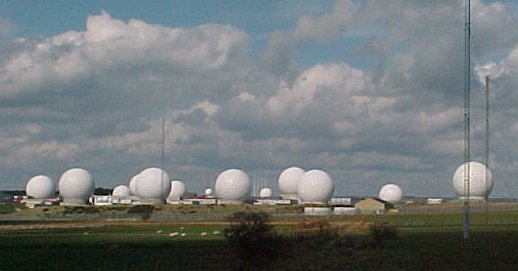 In 1984, British Telecom and MoD staff completed a $25 million extension to Menwith Hill Station known as STEEPLEBUSH. The British government constructed new communications facilities and buildings for STEEPLEBUSH, worth L7.4 million. The expansion included a 50,000 square foot extension to the Operations Building and new generators to provide 5 Megawatts of electrical power. The purpose of the new construction was to boost an cater for an 'expanded mission' of satellite surveillance. It also provides a new (satellite) earth terminal system to support the classified systems at the site. With another $17.2 million being spent on special monitoring equipment, this section of the Menwith Hill base alone cost almost $160 million dollars. Menwith Hill Station is an extensive complex of domes, vertical masts and satellite dishes, as well as more than 4.9 acres of buildings. There are 23 spherical domes and three satellite dishes, one of which is sixty meters in diameter, all pointing in an easterly direction. The tall radio masts appear to be high frequency radio supports. Since 1985 the number of domes and dishes at the base has increased from four to 26. Current expansion plans for the base include building two more radomes, and an earth-sheltered uninterruptible power-supply bunker and a Mission Support Building. The two 16-meter domes will require moving the site boundary, including fencing and lights, around 160 meters closer to the A59 Harrogate-Skipton road to the south. The base now constructs radomes before dish construction begins so that observers cannot determine which satellites the dishes are targetted against. The expansion is to establish a European ground relay system at Menwith Hill which will be part of a new generation of satellite communications. In addition, an initiative to address security deficiencies at Menwith Hill includes fencing the perimeter of the site. 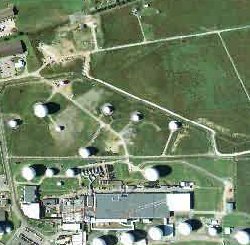 In addition, the PUSHER High Frequency Direction Finding (HFDF) system at Menwith Hill monitors radio transmissions covering the HF frequency range between 3MHz and 20-30MHz, including military and civilian embassy, maritime and air radio communications. As with other HFDF stations, PUSHER consists of three concentric rings of monopoles, each ring having a total of 24 monopoles. Initially, tapes containing data collected at Menwith Hill were returned via air to the United States for analysis. The Post Office installed two wideband circuits to Menwith Hill in 1975 which were connected to the nearby Hunters Stones microwave radio station, a part of the country-wide microwave network which carried British long-distance telephone calls during the 1970s and 1980s. Starting in 1992 British Telecom [BT] added digital optical fiber cables, which by 1996 were capable of carrying more than 100,000 simultaneous telephone calls. RAF Menwith Hill is a Crown freehold site belonging to the Ministry of Defence. The designation RAF Menwith Hill came into effect on 19 February 1996. This was simply an administrative change to bring the base into line with other RAF sites made available by the Ministry of Defence to the United States Government. There is no security of tenure agreement in place at RAF Menwith Hill. The assurances that were given to the US authorities in 1955 and again in 1976 that the site would be made available to the US Forces by Her Majesty's Government for a period of 21 years, and which are known as the security of tenure arrangements, were given to facilitate the commitment of US funding to the station. They were an administrative mechanism, and did not constitute any form of renewable lease for the site. 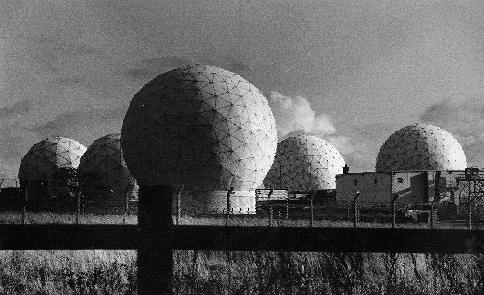 Women have been permanently camped at the Menwith Hill Women's Peace Camp for several years to draw attention to the facility. The camp is at Kettering Head lay-by on the A59 about 7 miles west of Harrogate. In the early 1990s, opponents of the Menwith Hill station obtained large quantities of internal documents from the facility. The activists routinely climbed over the fence and go wherever they can inside to gather as much intelligence as they can about the activities and what is going on. In the past, this did not violate any British laws, even the trespassing law, as long as they leave at once whenever they are found by the guards. However a new 1996 military lands bylaw criminalized trespass on the site. In September 1997 a judge at York Crown Court ruled that the new military bylaws at the Menwith Hill US-NSA spy base were invalid because they took in land which was not being using for military purposes. The ruling was based on the fact that facility's lands were 70% occupied by sheep. The Ministry of Defence subsequently announced that the decision would be appealed to the High Court. 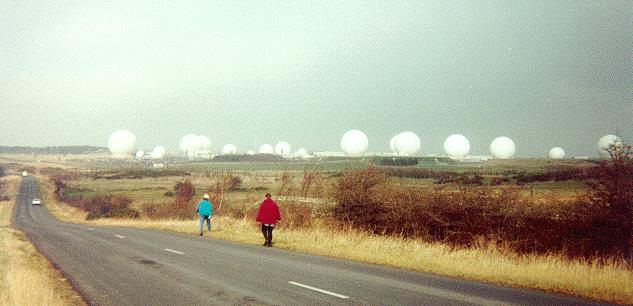 In 1995, in addition to funds otherwise available for such purpose, the Secretary of the Army was authorized to transfer or reprogram funds for the enhancement of the capabilities of the Bad Aibling Station and the Menwith Hill Station, including improvements of facility infrastructure and quality of life programs at both installations. This provision would permit the Department of the Army to use up to $2 million of appropriated O&M funds per annum, at Menwith Hill and Bad Aibling, to rectify infrastructure and quality of life problems. It would in no way obviate or modify current law or practice with regard to reprogramming amounts in excess of $2 million. Previously the Army was prohibited by 31 U.S.C. section 1301, from using appropriated funds to support an NSA installation, notwithstanding the fact that the Army has become the Executive Agent for these field sites. Although the Director of Central Intelligence could use his special authorities under section 104(d) of the National Security Act of 1947, the procedures available under that law are extremely time consuming and were not intended to accommodate relatively minor transfers of funds. 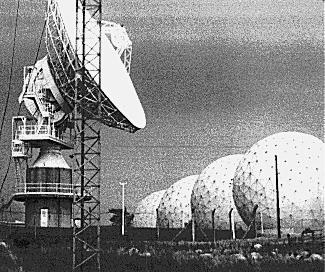 |
More can be addded on request. Direct your requests at vinit@theunexplainedmysteries.com